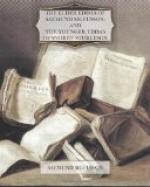OF TYR.
26. “All the gods appear to me,” said Gangler, “to have great power, and I am not at all surprised that ye are able to perform so many great achievements, since ye are so well acquainted with the attributes and functions of each god, and know what is befitting to ask from each, in order to succeed. But are there any more of them besides those you have already mentioned?”
“Ay,” answered Har, “there is Tyr, who is the most daring and intrepid of all the gods. ’Tis he who dispenses valour in war, hence warriors do well to invoke him. It has become proverbial to say of a man who surpasses all others in valour that he is Tyr-strong, or valiant as Tyr. A man noted for his wisdom is also said to be ‘wise as Tyr.’ Let me give thee a proof of his intrepidity. When the AEsir were trying to persuade the wolf, Fenrir, to let himself be bound up with the chain, Gleipnir, he, fearing that they would never afterwards unloose him, only consented on the condition that while they were chaining him he should keep Tyr’s right hand between his jaws. Tyr did not hesitate to put his hand in the monster’s mouth, but when Fenrir perceived that the AEsir had no intention to unchain him, he bit the hand off at that point, which has ever since been called the wolf’s joint. From that time Tyr has had but one hand. He is not regarded as a peacemaker among men.”
OF THE OTHER GODS.
27. “There is another god,” continued Har, “named Bragi, who is celebrated for his wisdom, and more especially for his eloquence and correct forms of speech. He is not only eminently skilled in poetry, but the art itself is called from his name Bragr, which epithet is also applied to denote a distinguished poet or poetess. His wife is named Iduna. She keeps in a box the apples which the gods, when they feel old age approaching, have only to taste of to become young again. It is in this manner that they will be kept in renovated youth until Ragnarok.”
“Methinks,” interrupted Gangler, “the gods have committed a great treasure to the guardianship and good faith of Iduna.”
“And hence it happened,” replied Har, smiling, “that they once ran the greatest risk imaginable, as I shall have occasion to tell thee when thou hast heard the names of the other deities.
28. “One of them is Heimdall, called also the White God. He is the son of nine virgins, who were sisters, and is a very sacred and powerful deity. He also bears the appellation of the Gold-toothed, on account of his teeth being of pure gold, and also that of Hallinskithi. His horse is called Gulltopp, and he dwells in Himinbjorg at the end of Bifrost. He is the warder of the gods, and is therefore placed on the borders of heaven, to prevent the giants from forcing their way over the bridge. He requires less sleep than a bird, and sees by night, as well as by day, a hundred miles around him. So acute is his ear that no sound escapes him, for he can even hear the grass growing on the earth, and the wool on a sheep’s back. He has a horn called the Gjallar-horn, which is heard throughout the universe. His sword is called Hofud (Head).




